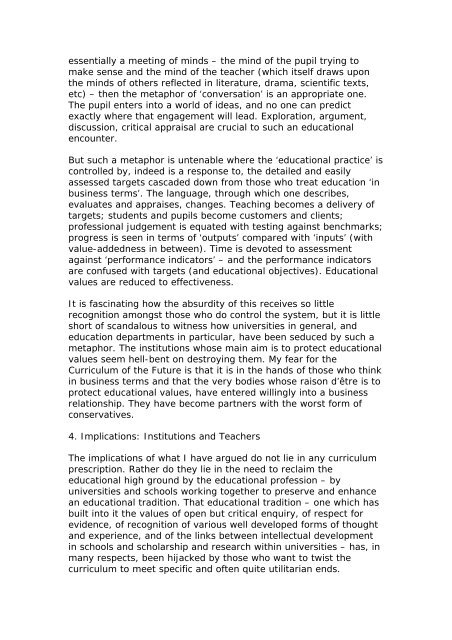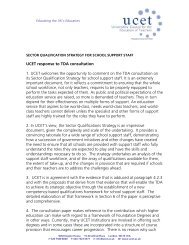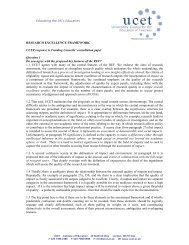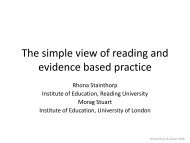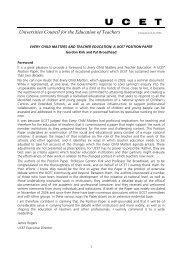The School Curriculum Ten Years Hence - UCET: Universities ...
The School Curriculum Ten Years Hence - UCET: Universities ...
The School Curriculum Ten Years Hence - UCET: Universities ...
Create successful ePaper yourself
Turn your PDF publications into a flip-book with our unique Google optimized e-Paper software.
essentially a meeting of minds – the mind of the pupil trying to<br />
make sense and the mind of the teacher (which itself draws upon<br />
the minds of others reflected in literature, drama, scientific texts,<br />
etc) – then the metaphor of ‘conversation’ is an appropriate one.<br />
<strong>The</strong> pupil enters into a world of ideas, and no one can predict<br />
exactly where that engagement will lead. Exploration, argument,<br />
discussion, critical appraisal are crucial to such an educational<br />
encounter.<br />
But such a metaphor is untenable where the ‘educational practice’ is<br />
controlled by, indeed is a response to, the detailed and easily<br />
assessed targets cascaded down from those who treat education ‘in<br />
business terms’. <strong>The</strong> language, through which one describes,<br />
evaluates and appraises, changes. Teaching becomes a delivery of<br />
targets; students and pupils become customers and clients;<br />
professional judgement is equated with testing against benchmarks;<br />
progress is seen in terms of ‘outputs’ compared with ‘inputs’ (with<br />
value-addedness in between). Time is devoted to assessment<br />
against ‘performance indicators’ – and the performance indicators<br />
are confused with targets (and educational objectives). Educational<br />
values are reduced to effectiveness.<br />
It is fascinating how the absurdity of this receives so little<br />
recognition amongst those who do control the system, but it is little<br />
short of scandalous to witness how universities in general, and<br />
education departments in particular, have been seduced by such a<br />
metaphor. <strong>The</strong> institutions whose main aim is to protect educational<br />
values seem hell-bent on destroying them. My fear for the<br />
<strong>Curriculum</strong> of the Future is that it is in the hands of those who think<br />
in business terms and that the very bodies whose raison d’être is to<br />
protect educational values, have entered willingly into a business<br />
relationship. <strong>The</strong>y have become partners with the worst form of<br />
conservatives.<br />
4. Implications: Institutions and Teachers<br />
<strong>The</strong> implications of what I have argued do not lie in any curriculum<br />
prescription. Rather do they lie in the need to reclaim the<br />
educational high ground by the educational profession – by<br />
universities and schools working together to preserve and enhance<br />
an educational tradition. That educational tradition – one which has<br />
built into it the values of open but critical enquiry, of respect for<br />
evidence, of recognition of various well developed forms of thought<br />
and experience, and of the links between intellectual development<br />
in schools and scholarship and research within universities – has, in<br />
many respects, been hijacked by those who want to twist the<br />
curriculum to meet specific and often quite utilitarian ends.


